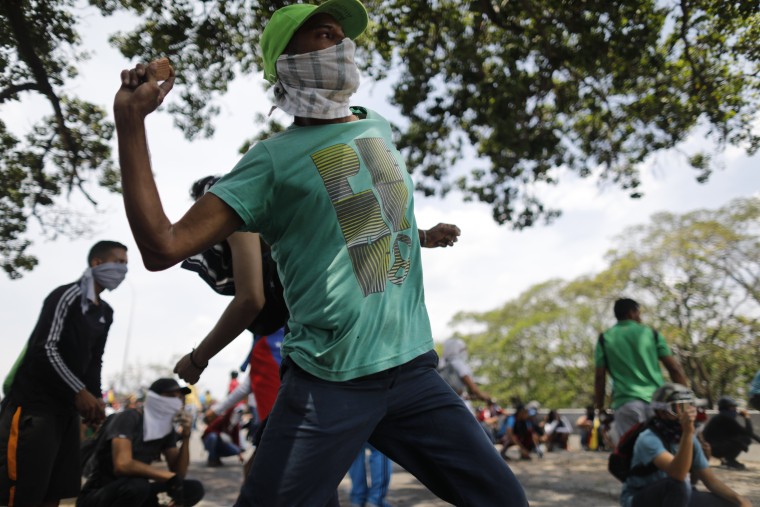MIAMI — When opposition leader Juan Guaidó emerged in a video Tuesday morning, talking of insurrection and flanked by heavily armed soldiers and the country’s best-known political prisoner, Leopoldo López, many thought Nicolás Maduro’s presidency had neared its end.
But Maduro remains in office, and there is no sign yet that Guaidó has amassed enough support from the military or the civilian population to oust him. One day later, many are still wondering what transpired and how Maduro has clung to power despite the chaos engulfing Venezuela.
Here are some of the reasons why it will be difficult — but not impossible — for the uprising to succeed.
Distrust among the military
The powerful armed forces still hold the key to Maduro’s future, and its leaders prefer the current regime.
“The military has deep distrust of the opposition and the United States,” said Brian Fonseca, director of the Jack D. Gordon Institute for Public Policy at Florida International University.
During the past 15 years, the Maduro government has purged the military to make sure those remaining in the ranks are loyal to the regime.
Analysts like Fonseca say that senior officials have amassed wealth through corrupt activities, including drug trafficking. Though there have been offers of amnesty, there is distrust of the opposition and many officials calculate that amnesty could be reversed.
Guaidó did manage to flip a high-ranking official from the SEBIN secret police force, Gen. Manuel Ricardo Christopher Figueroa, suggesting cracks in the inner circle.
But so far appeals to the military to abandon Maduro have not brought a large number of high level defections necessary to oust the leader.
U.S. involvement
Many were startled when national security adviser John Bolton said Tuesday that Venezuelan Defense Minister Vladimir Padrino López, Supreme Court President Maikel Moreno, and others had been talking to the opposition and had agreed to help oust Maduro.
The suggestion was followed by the appearance of Padrino López on national television lashing out against those involved in the uprising and calling it “a coup.”
“By Bolton putting this out there, he is creating divisions between the kleptocrats in power,” Fonseca said. “That’s an important communications strategy. It further weakens their cohesiveness.”
In another surprising comment, Secretary of State Mike Pompeo said during an interview that Maduro had been prepared to leave power and had a plane at the tarmac ready to take him to Cuba.
A factor that has allowed Maduro to remain in power is the support he receives from Cuba, Russia and China.
“Nicolás Maduro could have accepted to leave but he is not the one who decides,” said Antonio Rivero, an exiled Venezuelan military general. “He is there because he is connected to Cuba and Russia.” Pompeo suggested Maduro was talked out of leaving by the Russians.
Rivero thinks part of the reason military officials did not heed the call to topple Maduro was a failure in the plan to include more military units.
He said there are several factors that prevented Padrino López and others from joining the opposition, including fear of facing prison time, though they have been offered amnesty, distrust of the opposition and an anti-imperialist ideology.
Still Chavistas
But some analysts think the reason Maduro has remained in power goes beyond the military.
Eva Golinger, an American attorney and close friend of Hugo Chávez — Maduro’s mentor and predecessor as Venezuela's leader — said that although most people are not happy with the situation in Venezuela and want a change in leadership, there are still many Chavistas who support the country's socialist ideology.
“Many don’t support Juan Guaidó because he was propped up by the U.S.,” Golinger said.
In the case of Padrino López, the defense minister, for example, Golinger said he is not a Maduro loyalist but a Chávez loyalist.
She suggested there could be an internal negotiation where someone like socialist party leader Diosdado Cabello may take power with a coalition of generals.
For the past few years, Venezuelans have been struggling with soaring hyperinflation as well as shortages in food, water and medicine. Recent nationwide blackouts have left millions in the dark. An estimated 3.7 million Venezuelans have fled their country and nearly 5,000 more are leaving each day.
For Fonseca, Tuesday’s events “showed there are deepening fractures within the military.” At the same time, he said, Guaidó may have lost credibility by saying the military was behind him while they never showed up. “How much of the fracturing has lined up behind Guaidó?”
FOLLOW NBC LATINO ON FACEBOOK, TWITTER AND INSTAGRAM.


